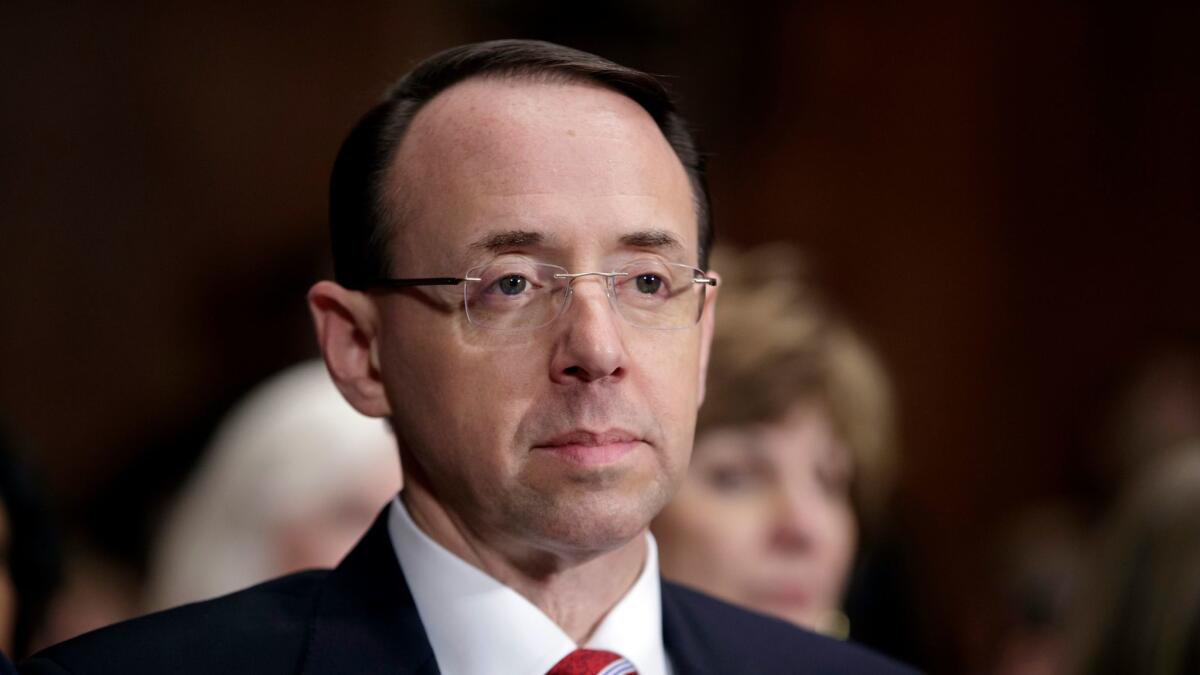Opinion: All eyes in Washington are on Rod Rosenstein. Does he have what it takes to investigate Trump?

- Share via
Now that FBI Director James B. Comey is gone, the most important person in the investigation of the Trump campaign’s ties to Russia is the little-known man in the middle: Rod Rosenstein, the No. 2 official in the Justice Department.
Rosenstein now has the power to allow the FBI inquiry launched by Comey to continue unimpeded – or to essentially shut it down, as President Trump says he would like.
So it was notable that Press Secretary Sean Spicer pinned responsibility for White House scrutiny of Comey on Rosenstein, a career prosecutor who isn’t even a member of the Cabinet.
“It was all him,” Spicer told reporters. “No one from the White House. That was a [Justice Department] decision.”
It’s not clear that was true; other accounts say Trump has wanted to rid himself of Comey for months. In any case, the decision to fire the FBI director was all Trump’s, as he made clear in the letter by which he fired him.
But the White House wanted to make it look like Rosenstein’s choice, because he’s not a dyed-in-the-wool Trumpite (like, for example, his boss, Atty. Gen. Jeff Sessions); he’s a nonpartisan professional who’s been praised by leading Democrats. When Rosenstein was nominated as deputy attorney general, the Senate confirmed him by an amazingly bipartisan margin, 94-6.
The White House pointed to the long memo Rosenstein wrote laying out Comey’s failings: the “serious mistakes” he made when he announced that he was closing the investigation into Hillary Clinton’s emails, more mistakes when he announced that the inquiry was reopened just days before the election, and finally “his refusal to accept the nearly universal judgment that he was mistaken.”
Here’s the curious thing about Rosenstein’s memo, though: It never actually recommends that Comey should be sacked.
It comes pretty close. “Having refused to admit his errors, the Director cannot be expected” to fix the FBI’s problems, it says. But Rosenstein never explicitly states that Comey needs to go.
That has led some of Rosenstein’s admirers in both parties to argue that the deputy attorney general was played – that he was used by Trump and Sessions to justify a decision they had already been made.
The sequence of events is intriguing. Last week, Comey asked Rosenstein to increase the budget and staffing of the Trump investigation. (The deputy attorney general is the FBI director’s immediate superior on the Justice Department organization chart.) On Monday, Rosenstein met with Sessions and Trump to discuss the road ahead, and the president reportedly asked him to write a memo on Comey. On Tuesday, the memo landed, Sessions recommended that Comey be fired, and Trump immediately agreed.
Rosenstein’s friends don’t doubt that he believed Comey made huge mistakes; that’s a widespread view among Washington lawyers in both parties.
But as Donald B. Ayer, a former deputy attorney general in the George H.W. Bush administration, wrote, Rosenstein’s “correct assessment of those mistakes is now being used to justify firing for a very different reason.”
That leaves Rosenstein in a precarious position — oddly like the one Comey occupied for the last three months.
He’s the top Justice Department official in charge of the Trump investigation. (Sessions has recused himself from that role, since he was a big player in Trump’s campaign.)
He’s essentially in charge of the FBI, too. The bureau’s acting director, Andrew McCabe, has been criticized by Republicans because his wife, a Democrat, ran for the state Senate in Virginia and accepted donations from Clinton allies. So if anyone is going to protect the FBI and make sure the Trump investigation gets the staff and budget it needs, it will have to be Rosenstein.
He has one major tool to get what he wants: the fact that he can publicly resign. Trump and the White House look terrible for firing Comey; if the man they used as their character witness jumps ship, it will look much worse.
Senate Democrats have called on Rosenstein to appoint an independent special counsel to take over the investigation. Rosenstein has refused, arguing: “As far as I’m concerned, every investigation conducted by the Department of Justice is an independent investigation.” Now he’s got to prove he meant it.
Follow the Opinion section on Twitter @latimesopinion and Facebook
More to Read
A cure for the common opinion
Get thought-provoking perspectives with our weekly newsletter.
You may occasionally receive promotional content from the Los Angeles Times.










